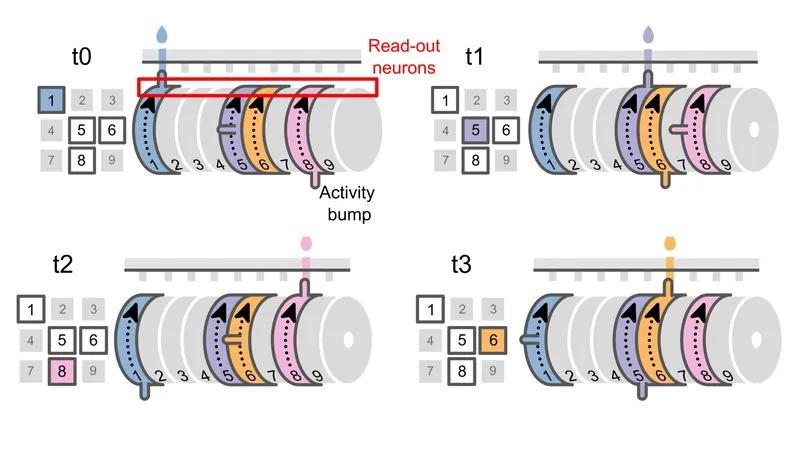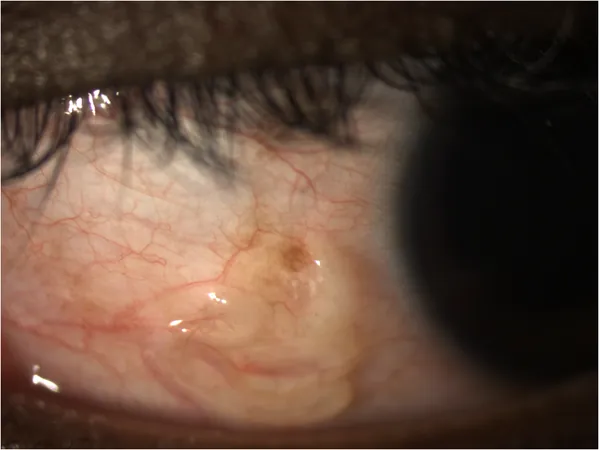
Revolutionary Discovery: How Brain Cells Create a GPS for Our Behavior!
2024-11-06
Author: Wei Ling
Revolutionary Discovery: How Brain Cells Create a GPS for Our Behavior!
Neuroscientists have made a groundbreaking discovery about how certain brain cells function like an internal GPS, forming various coordinate systems that help us navigate through sequences of actions. Just as a music box can be set to play an array of melodies, these specialized cells allow our brains to execute complex behavioral sequences seamlessly.
This pivotal research, published in the esteemed journal Nature, sheds light on the intricate algorithms our brains utilize to plan and reason, offering critical insights into mental health disorders such as schizophrenia. Understanding these cellular mechanisms could be the key to addressing significant psychiatric challenges.
A team from the Sainsbury Wellcome Center at UCL and the University of Oxford conducted experiments with mice as they engaged in different behavioral sequences sharing a common structural framework. This study illuminated how animals can generalize knowledge from familiar tasks to tackle novel challenges—an ability intrinsic to intelligent behavior and problem-solving.
Dr. Mohamady El Gaby, the study's lead author and a postdoctoral neuroscientist, emphasizes the day-to-day challenges we face that require innovative thinking. 'Consider cooking. Encountering a new recipe compels you to adapt your prior culinary experiences, allowing you to infer the necessary steps, even without direct experience. Our goal was to elucidate how the brain processes this adaptability at a cellular level and to uncover the underlying algorithms at play.'
During the study, researchers assigned mice a sequence of four goal locations (A, B, C, and D), which although varied in detail, maintained a consistent overall structure. Remarkably, after navigating enough of these sequences, the mice demonstrated the ability to anticipate steps that they had never encountered before. Upon reaching goal D for the first time, they instinctively returned to A—indicating a comprehension of the behavioral structure without any prior experience of that specific action.
To delve deeper into the mechanics of this learning process, the research team employed silicon probes to capture the activity of numerous cells within the medial frontal cortex. Their findings revealed a collective mapping of the mice's 'goal progress.' For instance, certain cells activated at different progress stages—one would fire when the animal was 70% towards its goal, regardless of the location or effort required to get there.
Dr. El Gaby elaborated, 'These neurons not only track the animal’s behavior but do so relative to concrete sub-goals—like preparing ingredients in a cooking process—while also monitoring progress toward the overarching objective, such as completing the meal. This means these ‘goal progress’ cells act as versatile building blocks for a behavioral coordinate system.'
The implications of these findings are vast. The neurons essentially create multiple coordinate systems to inform the brain of the current status relative to specific actions, allowing it to execute complex behaviors as needed.
Looking ahead, the research team is working to identify how these neural activity patterns are established in the brain's connective pathways during the acquisition of new behaviors, as well as how they develop in growing brains. Early indications suggest that similar patterns of brain activity may be evident in healthy humans, which has propelled the team into collaborations with psychiatrists to investigate the impact of these processes on conditions like schizophrenia. This research could elucidate why individuals with schizophrenia often mistakenly assess their goal progress, leading to false beliefs or delusions.
This remarkable research not only deepens our understanding of how we organize and execute complex behaviors but could also pave the way for revolutionary interventions in mental health treatment. Stay tuned, as we unravel more about the brain’s secrets and its intricate dance with our behaviors!



 Brasil (PT)
Brasil (PT)
 Canada (EN)
Canada (EN)
 Chile (ES)
Chile (ES)
 España (ES)
España (ES)
 France (FR)
France (FR)
 Hong Kong (EN)
Hong Kong (EN)
 Italia (IT)
Italia (IT)
 日本 (JA)
日本 (JA)
 Magyarország (HU)
Magyarország (HU)
 Norge (NO)
Norge (NO)
 Polska (PL)
Polska (PL)
 Schweiz (DE)
Schweiz (DE)
 Singapore (EN)
Singapore (EN)
 Sverige (SV)
Sverige (SV)
 Suomi (FI)
Suomi (FI)
 Türkiye (TR)
Türkiye (TR)